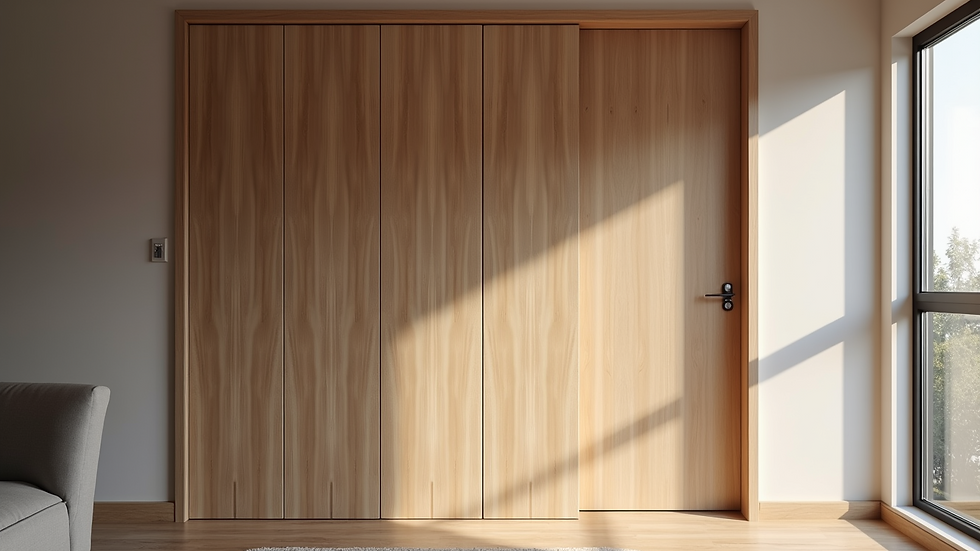Insulate Your Apartment with Soundproofing: A Feng Shui Approach
- Tiffini Truth

- Sep 22, 2025
- 4 min read
Updated: Jan 22
Living in an apartment can be enjoyable, but noise often disrupts your comfort. The sound of footsteps, lively conversations, or city life can break your peace. As someone who values and practices feng shui, I believe our spaces should promote calm and balance inside and out. So, I decided to tackle noise in my apartment hallway by soundproofing my wooden front door.
In this post, I’ll reveal how I turned my door into a soundproof sanctuary for under $100. With the right materials and techniques, I achieved a 60-70% reduction in noise compared to traditional wood doors. Let’s explore how I did it!
Why Soundproofing Matters for Feng Shui
Feng shui emphasizes the importance of a peaceful living environment. A noisy atmosphere can create stress and anxiety, disrupting your ability to maintain balance.
Soundproofing your hallway door not only creates a quieter space but also enhances your well-being. Studies show that a quiet environment improves focus, promotes relaxation, and even enhances sleep quality. By reducing disturbances, you can dedicate more time to self-care and mindfulness.
It is also crucial for all residents to be mindful of the noise they make. You can live a great life without disturbing your neighbors in apartment or multiplex buildings. When people contribute to a peaceful and respectful community, it benefits everyone involved.
The Role of Landlords in Sound Management
While individual residents can take steps to soundproof their own spaces, landlords have a vital role in managing noise within their apartment buildings. They should actively address soundproofing concerns before turning units over to tenants and ensure their buildings are designed to limit disturbances. This means they should feel the pressure from the consumer to prioritize people's best interests over profit.
Investing upfront in functional insulation and design saves you headaches and stress down the line; this is my motto!
In the long term, this saves landlords time fielding noise complaints that could be avoided with foresight. It’s an additional 10-15% investment, which is minimal compared to the sound, heat, and pest prevention savings.
Foresight is key and often lacking in residential real estate projects across Canada. Incorporating feng shui can play a vital role in better building planning and renovation approaches that a basic designer or architect may not consider.
For example, using materials that absorb sound in common areas can significantly reduce overall noise levels. A survey conducted by the National Apartment Association found that 55% of renters consider noise a deal-breaker when looking for an apartment. Landlords who prioritize sound management can create happier and more satisfied tenants.
How I Soundproofed My Hallway Door
Let’s take a closer look at how I soundproofed my apartment hallway door. This step-by-step guide covers the materials I used, all for under $100.
Step 1: Assess the Door
I began by examining my door. It was a standard wood door with minimal insulation. I realized that adding weight and insulation would be essential to effectively reduce noise.
Step 2: Gather Your Supplies
Here’s what I used to soundproof my door:
Weatherstripping Tape
This tape seals gaps around the door frame, effectively blocking sound from entering. I found a great option by Nayotaa on Amazon.
Acoustic Door Sweep
An acoustic door sweep prevents sound from traveling beneath the door. The Everlasting Comfort Memory Foam Door Draft Stopper I used is available here.
Mass Loaded Vinyl (MLV)
This heavy material significantly reduces sound transmission by adding weight to the door. Here's a great vinyl weather strip option that comes in various colors. This will be more permanent, so check with your landlord as it may chip paint when removed.
Soundproofing Foam Panels
These panels absorb sound waves and enhance the effectiveness of the soundproofing. The 50 black acoustic panels I used can be found here.
Adhesive Spray or Alien Tape
This spray affixes MLV and foam panels securely to the door if you own your unit. If you rent (like I do), you will want to get a roll of double-sided Alien tape, which can be easily removed to get your full deposit back.
Step 3: Installation
Apply Weatherstripping Tape
I began by applying weatherstripping tape around the door frame. This simple upgrade immediately helped block sound coming through the gaps.
Install the Acoustic Door Sweep
Next, I attached the acoustic door sweep at the bottom of the door. This process was easy and further reduced sound transmission.
Add Soundproofing Foam Panels
Finally, I affixed soundproofing foam panels to the door. I cut small pieces of magic tape and placed them where I wanted panel coverage. Then I placed the panels, and the double-sided tape came in handy to affix these panels to the door.
Step 4: Enjoy the Peace
After finishing the installation, I was delighted to discover that my hallway door was now 60-70% soundproof, contrasting sharply with the standard wood doors in my building. I finally experienced a quieter home space without constant interruptions from hallway noise.

My Final Soundproofing Thoughts
Transforming your apartment hallway door into a soundproof sanctuary is both affordable and achievable. With a bit of effort and the right materials, you can create a more peaceful environment that enhances your feng shui and overall well-being.
Dealing with noise in an apartment can disrupt your inner peace; therefore, taking effective steps to minimize it is crucial. By soundproofing your door, you improve your living experience and contribute to a more considerate community.
Let’s all work together to create peaceful living spaces where everyone can thrive and find harmony. Feng shui starts from the inside out, in that order. Be direct and assertive in your apartment hunts and advise landlords to invest in creating sound barriers by passing on places that have poor sound insulation.
When you own your home, you can go even deeper with the design process by using sound panels to seal spaces. Stay tuned to this blog for more on soundproof materials that improve aesthetic and energetic flow in your space.
T.T



Comments